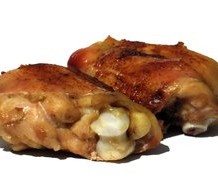Possible Way In Which Meat Increases Cancer Risk

|
Numerous studies have already linked the consumption of meat, in particular red meat and processed meats, to increased cancer risk. Now, recent research has given us a possible idea of how red meat could have this undesirable effect.
In gist, it has something to do with chronic inflammation – a study has found that eating such foods introduces a certain molecule into the body, which then plays a part in inducing a state of chronic inflammation, thereby increasing cancer risk. More details of the study are discussed below.
Study Shows How Meat Spurs Cancer Growth
by Sherry Baker
(NaturalNews) Like to eat meat? Consider this unappetizing truth: When you gulp down a nice juicy steak or hamburger, you are contributing to tumor-fueling inflammation in your body.
In fact, eating a diet rich in red meat has long been linked to a host of ills including an increased risk of several types of cancer. But what is it about meat consumption that could impact cancer growth? Now scientists at the University of California, San Diego School of Medicine, have found a mechanism that explains how eating red meat, as well as milk, could spur the growth of malignancies. The new study, headed by Ajit Varki, M.D., suggests that inflammation resulting from a molecule introduced through eating these foods could make cancer grow. The research is set for upcoming publication in the Proceedings of the National Academy of Sciences (PNAS).
Dr.Varki, UC San Diego School of Medicine distinguished professor of medicine and cellular and molecular medicine and co-director of the UCSD Glycobiology Research and Training Center, and his research team studied a non-human glycan, or sugar molecule, known as N-glycolylneuraminic acid (Neu5Gc). Although this molecule is not produced naturally in the human body, it’s incorporated into human tissues if you eat red meat. The body then develops antibodies against Neu5Gc – and this immune response could potentially trigger a low-grade chronic inflammation, spurring the growth of cancer. In a statement prepared for the media, Dr. Varki explained it has been recognized by scientists for some time that chronic inflammation can stimulate cancer progression.
“We’ve shown that tumor tissues contain much more Neu5Gc than is usually found in normal human tissues. We therefore surmised that Neu5Gc must somehow benefit tumors,” Dr. Varki said in the press statement. So the scientists came up with this hypothesis: The fact that Neu5Gc accumulates in human tumors despite circulating anti-Neu5Gc antibodies suggests a low-grade, chronic inflammation has developed, and caused the tumor to grow. To test this idea, the researchers worked with specially bred mice. The animals lacked the Neu5Gc molecule , just as humans do before they eat red meat and the molecule is absorbed into their bodies, and they had tumors.
Pages: 1 2




















0 Comments
Trackbacks/Pingbacks